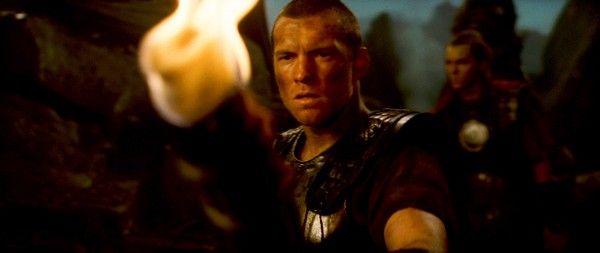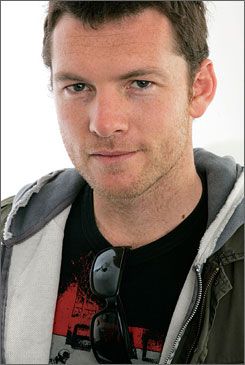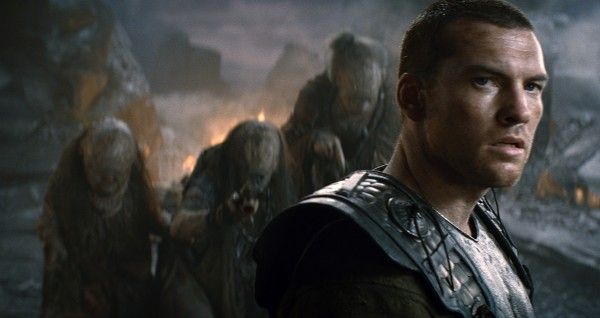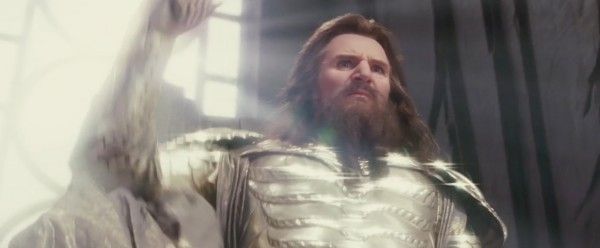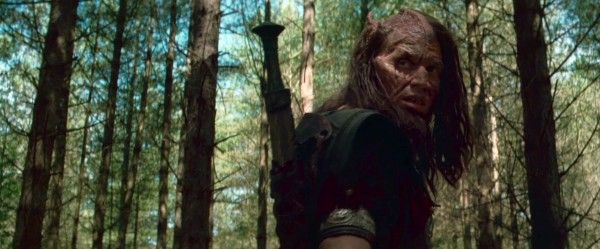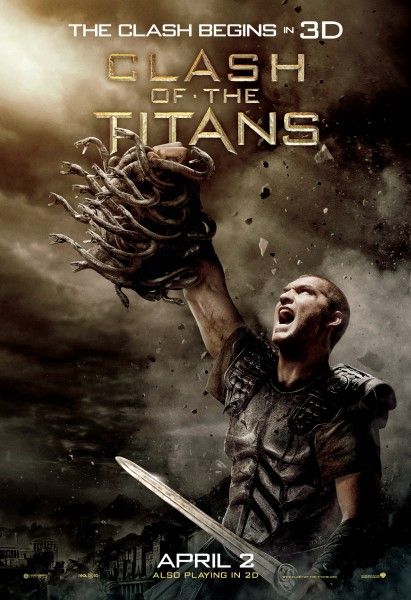Sam Worthington is an actor with a career that is undoubtedly on the rise. The native Australian graduated from Sydney's prestigious National Institute of Dramatic Art and went on to star in a number of Australian television shows and films, before being handpicked by director James Cameron to star in the groundbreaking sci-fi 3-D epic Avatar, which has now earned more than $2 billion worldwide, making it the top-grossing film of all time.
Prior to the release of Avatar, Sam Worthington made a definite impression on American audiences when he starred opposite Christian Bale in the sci-fi action flick Terminator Salvation. After filming wrapped, he took off for England to play Perseus in a re-imagining of the epic adventure Clash of the Titans, opening on April 2nd.
During a press conference to promote and talk about his role in Clash of the Titans, Sam Worthington talked about updating the original to make it relatable now, the comparisons he saw in the characters to Star Wars and that heroism comes from how other people see you. He also said that he'll be going into production on The Texas Killing Fields once he wraps the publicity tour for Clash, and that he's spoken to James Cameron about ideas for Avatar 2, but that the film won't go into production until the filmmaker finds a way to further challenge and top himself. Check out what he had to say after the jump:
Question: With all these big projects you've already been a part of, are you working hard to keep a personal life separate from your work?
Sam: I'm not out here to be a star. I'm out here to help tell stories. If you want to be a star, go on "Big Brother." I came out here to help the director facilitate his vision, which is to tell these escape stories. You can write whatever you want about me in websites and newspapers, but no one really knows me. They get the idea that I'm a tough, heroic figure, but I'm a sensitive pussycat. When I do my job, I dive into these characters and try to flush something out of myself into these characters, and hopefully that translates well. But, I don't look at any disassociation. I do movies that I would like to go and see. I think that's a good barometer of how I choose films. I like going to these movies. Our job is to make sure the audience gets their $16 worth. That's my job.
Terminator Salvation, Avatar and Clash of the Titans all have a lot of special effects. Having come out of drama school and done it the traditional way, how tricky is it for you to do that? Does it get easier to do each film, or does each film have their own particular challenges?
Sam: Any acting is a stretch of the imagination. That's your job. Acting is truth in imaginary circumstances. Acting with green screen or a motion capture stage, you're striving for absolute truth in absolutely imaginary circumstances. The good thing about this is that we learned a lot of lessons from Avatar and I told Louis that you can't act with nothing. It's impossible. Plus, your body reacts differently. If you're hitting something that's not there, your muscles don't react. So, we talked to Louis about making every special effect, or visual effect that was going to be in the movie, practical. So, we built a big fiber glass scorpion and we had guys dressed up in green screen suits. Anything to actually react off made our job easier. The fact that we were in proper locations helped. We weren't in a motion capture stage. That changes it as well. But, I find acting with nothing, or trying to find the details to create something out of nothing, quite easy. That is drama school. That's doing a play. It's just about finding the details as necessary. If you put beans in a bean bag and you only put two or three beans in the bag, it's not a very interesting seat. The more beans you put in, the easier it is. We had to know the dimensions of the scorpion and how fast Medusa was going to run, and then we can act accordingly when they supply you with nothing there.
What were some of the physical challenges of being in this film and fighting in sandals and a dress?
Sam: I didn't wear sandals. I wore Nikes, and I painted toes on my Nikes. I was sprinting off and doing a lot bigger stunts while they had dirt getting in their sandals and they were tripping all over the place. I was the smart one that thought ahead. We were above the clouds as well. The altitude was ridiculous. I don't know exactly how high up we were. And, the terrain of Wales sucked. That was the worst place I've ever filmed. I love the Welsh and Wales is a beautiful place, but not a fucking slate mine with the rain going up. That was tough. That is the entrance to the Underworld. You know you're in trouble when everyone around you on set is wearing a hard hat and things are falling off while you're just standing there in your dress. And, shooting underwater was harder than I thought. Underwater is tough. I thought it would be easy. It slows everything done. It times everything by two. It's weird. Screw doing The Abyss. I don't know how Jim Cameron did it 'cause underwater is a hard place to film. That's only 20 or 35 seconds of film, but that took us at least four days.
Were you a fan of the original film?
Sam: Yeah. I saw it before and then I just reacquainted myself with it. I'm quoted on the Film School Rejects website about what I felt about the original, so you can look there and see it. But, everyone has a fondness for the original. We were on tricky ground here. The purists can crucify you if we screw up. So, I reacquainted myself with it to see if we were going to be okay with Louis' intention of how to ramp this thing up. Obviously, the visual effects and the stop motion that Harryhausen did was fantastic, for the time, but the visual effects nowadays can boost it, as you can see. I wanted to see, "Are the themes relevant to today's society, especially to my 9-year-old nephew?" That's where I felt it wasn't up-to-date. The themes of embracing the God side and achieving things as a God are not good for any of us. That you can only succeed as a God is a terrible thing to say to a kid. If you can say that you can do it as a man, and look deep inside of you and do it as a man, I think that's a good message for anybody, and I really hammered Louis about wanting to embrace that side of it. So, the original was a good jumping-off point for us, but we weren't out to remake it as such. We were out to put our own modern-day spin on it, which is the key to watching anything. If you watch the Terminator series, you see how they had to create their own spin on the franchise.
Were you familiar with the stories of Greek mythology before making this film?
Sam: I don't know about in America or anywhere else, but in Australia we grow up learning the myths, like the Minotaur and the maze, and things like that. But, I didn't really study Greek mythology for this film. This is a fun ride. It's me in a dress with a couple of guys in dresses, with rubber swords, fighting monsters. It's not a history lesson. I'm a big believer in that, so I didn't really look deep into the old Perseus because he wore no clothes. I think that would have been quite horrific for young kids. We were well aware of them, but ours isn't a history lesson.
How much backstory did you develop for these characters before shooting?
Sam: We didn't want the boys to get lost, to be honest. It is fast. It's meant to be fast. It's a fun movie, man. It's fun, fast and furious. But, you don't want to suddenly lose sight of the fact that it's a group. It's Star Wars, in a sense. You've got your Luke Skywalker (Perseus), Han Solo (Draco) and Princess Leia (Io), the other two boys are C-3PO and R2-D2, and the bloke made of wood is Chewbacca. And, I said that to Louis one day and he said, "What?!" I said, "That's the principles of an epic journey. They're the archetypes that you need to go along." Thanks to the studio and thanks to Louis, we were able to flush out these boys. We went a lot different from what the original script was, and that means you've got a good collaborator of a director on board, who allows each bloke to try to bring out their individuality. Then, they ramp it up, speed it up and edit it, and hopefully the boys aren't just pushed to the background, like it was in Hart's War. That's what we set out to do, as a group, and everyone was pretty hands-on. It was about, "What am I doing, at this point in time? What's the relevance in my character? If I'm just the spear carrier in the background, it's not fair." And, I like that. When you get a group that's collaborative like that, that's actually good fun to film for six months. No one feels like they're wasted.
What is your definition of a hero?
Sam: Heroic is not fighting. It's actually getting back up off the canvas. Or, if someone else gets knocked down, you help them up. That's how I look at it. That's my definition of a hero. I wanted Perseus to be like a troubled adolescent. The whole movie is about family, in my book. He loses his adopted family, and he is a boisterous teen. I didn't want him to listen to anybody. Out of that, he finds a heroic quality through finding another family, and learns to calm down and become an adult. Every movie I do has a lot of similarities. There's a duality of man, whether it's half-man/half-God for Clash, half-man/half-robot for Terminator or half-man/half-big blue alien for Avatar. I'm either screwed up, searching for something within myself, or I like those characters. If you have a character that has an inner conflict, like that duality can give you, and you put him in other conflicts, than you're either a villain or a hero. Heroism doesn't come out of what you believe you can do, but it's how other people endow you with it. I think, by him learning to calm down and embrace this family, they then can claim that he's a hero. That's how I look at heroism.
How was it to work opposite Liam Neeson?
Sam: It was intimidating and I shat myself. He's the big boy. When you're playing with the big boys, you man up and shut up and you listen. Liam acts with such grace. He's a gentle man and he's an imposing force on screen. You literally go in there and it's a learning experience. You observe what he can do on set, and he gives you advice on how to handle all this and the outside world with hopefully some sensitivity. Same with Ralph Fiennes. You just listen. These guys did Schindler's List, and Liam did Rob Roy and Taken. Collectively, there's 100-odd movies between them, so as far as an infant like me is concerned, you listen.
How did you shoot the scenes with the Pegasus?
Sam: Quickly because me and the horse didn't get along. I did a lot on a Gimble horse, and then for the rest, I tried not to get my head bitten off. He would just bite me all the time. And, we did the flying all on a green screen. It was pretty cool.
Do you like how the 3-D turned out?
Sam: Yeah, I do. It immerses you in a world. Jim proved that.
When did you film this, in relation to Avatar?
Sam: I finished Avatar in 2007. Then, straight after that, I did Terminator, two other movies and was going back and forth on Avatar. We worked on Avatar, right up until the last minute. I think Jim called me back one time after Clash.
Can you compare the experience of making Avatar with making Clash of the Titans?
Sam: I can't. Avatar is its own juggernaut. It's its own beast. We've seen that at the box office, and I can tell you that by filming it. You can't compare that movie to anything. But, this experience compared to Terminator was a lot tougher. I thought that this would be a cake walk. I thought me in a dress, running around would be easy, but it wasn't because it is fast. The way Louis shoots is very fast. There's a lot of energy on set, running around with three cameras, the whole time. Going to these extreme locations made it tougher than I thought, I must admit.
Has Jim Cameron talked to you at all about a sequel for Avatar?
Sam: We have discussed Avatar 2. He brought it up, even when we were filming it. He would have ideas that related to what we were filming in the first one. Obviously, we're not going to go into that until Jim finds himself a challenge. He's not the type of man that just goes into movies lightly. He's not going to just do a sequel to make money. But, we know that it's been embraced by audiences, so we're probably definitely going to undertake another one. But, it's up to Jim to find the challenge to push himself. Avatar 2 has to push the boundaries like the first one did.
Who do you play in The Texas Killing Fields?
Sam: I play a guy who was a real cop. It's inspired by true events and it's about murders that went down in a Texas city. It's an amalgamation of stories, but it's inspired by these horrific events that happened down there.
Are you working on that now?
Sam: After I finish promoting Clash.

